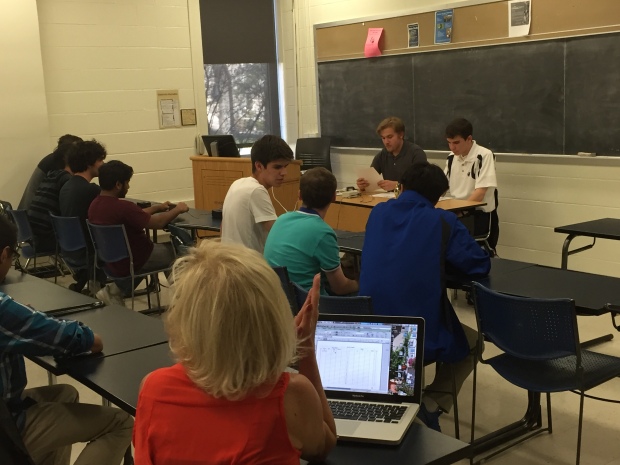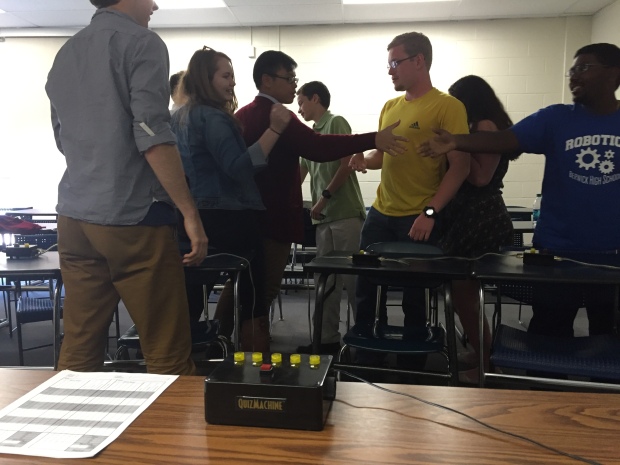The PA State Academic Competition took place yesterday in Harrisburg, PA on an interesting combination of NAQT tossups and CCIU format/rules. Lehigh Valley Academy emerged as the champion, with Henderson as the runner-up and Blue Mountain rounding out the finalists.
We have compiled the scores of the matches on a spreadsheet that you can view here and see a copy of the prelim schedule here. (Again, this is all unofficial–GPQB is not affiliated with any of the organizers of PSAC)
The Good:
The Tossup Questions. The NAQT tossup questions were excellent and of appropriate difficulty for the field, even for the teams that came from non-pyramidal circuits. This was the single biggest improvement from last year and one that went a long way towards increasing the legitimacy of PSAC.
Outstanding Knowledge. Given the opportunity to compete on fair, challenging pyramidal questions, the PA teams were more than up to the task, with some very impressive buzzes across categories, but particularly in History and Literature. While our state isn’t quite to the level of Illinois or even New Jersey yet in terms of nationally competitive teams, we have excellent depth and a lot of strong players (who will hopefully continue on to play in college!). Lehigh Valley Academy is certainly a worthy champion and it was neat to see some schools that we haven’t seen play much like Spring Grove and Blue Mountain show off their considerable knowledge.
Geographic Diversity. PSAC featured a geographically diverse field (although not from all corners) with some schools we haven’t yet seen on the regular quizbowl tournament circuit. We’d love to see schools like Blue Mountain, Allentown Catholic, Spring Grove, Garnet Valley, Souderton, Altoona, Honesdale, and all the others attend quizbowl tournaments throughout the year.
The Readers. Jim Stoddard is quite an enjoyable reader. Apart from a few accidental reveals of the answers to some questions and some interesting pronunciations, he was encouraging, enthusiastic, and often hilarious. Although we only had the audio intermittently from the Senate chamber, the quiz-master in there, Kate Campbell, there was also quite good, especially at pronouncing some tough words.
The Bad:
The Fanfare Rounds. The fanfare rounds were still highly uneven, with a mix of what seemed like NAQT-style lightning round questions and some very obvious CCIU-style holdovers. The current events questions were particularly problematic, managing to be both overly vague and meandering. There were also a large number of specific answers repeated within the fanfare rounds; some answerlines came up 3-4 times.
Repeating the Whole Question on Tossups. There’s no need with pyramidal tossup questions to repeat the entire question over again after a team guesses incorrectly. Since the clues get easier and there’s always a clear pronoun specifying what’s being looked for, in the future PSAC should do away with this rule and would save probably 5+ minutes per match.
The Ugly:
The Unbalanced Scheduling and Seeding. The random scheduling and tiny number of matches once again left several teams unfairly penalized while benefiting others. Given that playoff advancement and seeding came only based on total points scored and that the matches had 3 teams at once, a team’s advancement and seed was highly dependent on who its opponents were. This was particularly obvious in the 3 semifinal matches when the three teams combined for 230 in the first and 235 in the second, but only 175 in the third.
This also affected who made the playoffs. DuBois for instance had to play Lehigh Valley (1st in total points), Spring Grove (3rd), and Allentown Catholic (10th) in its 2 prelim matches while Honesdale didn’t play any team higher than 12th in total points in its 2 matches. Yet Honesdale made the playoffs while DuBois didn’t because of the total points criterion. And although Lehigh Valley triumphed in the final, they never had to play Manheim Township, who lost in a narrow heartbreaker to Henderson in the semifinals. This is why most quizbowl tournaments seed the prelim matches, play full round-robins in the playoffs, and use non-opponent-dependent tiebreakers like points-per-bonus for seeding.
In an even more bizarre instance to fill out the schedule, the final prelim round featured two teams competing for points that counted while a third team whose points would not count was also playing. This creates all kinds of imbalances and unfairness, much of it going back to the issues with the 3-teams-at-a-time schedule.
Suggestions for Improvement
- Seed the prelim matches. Quizbowl tournament results are readily available from around the state; why not at least consider using them to separate the top teams?
- No more 3-team matches. They introduce too many variables that make it harder to distinguish between teams and make one’s opponents more important than one’s own ability. Two-team matches would be much more fair to the teams.
- Increase the number of prelim matches. You need to give teams the opportunity to compete and see how they stack up against each other before seeding them into the playoffs. Going from the current 2 prelim matches to 4-5 would be much more fair to the teams. Winners and runner-ups from the prelim pools plus wildcards based on points-per-bonus could then make the playoffs.
- No need to repeat the whole question after an incorrect guess.
- Be sure to write the current events questions to make them both pithy and specific.
- Double-check the fanfare rounds for repeats.
We at GPQB are encouraged by the switch to NAQT questions this year and hope to see the trend continue in future years. Congratulations to all the teams who competed this year and we hope to see all of them on the quizbowl circuit around the state next year.
–The Staff


